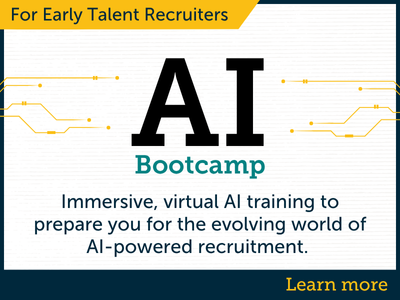Launched in 2018 with a flagship two-day immersive conference, Workday’s “Future Females in Tech Engagement Program” helps women to build career confidence and make the connections they need to get started in the tech industry.
“Historically, the technology sector has struggled to attract female employees,” says Helene McArdle, Workday’s early talent acquisition and programs senior manager.
“The Future Females in Tech Program aims to demystify technology careers and break down stereotypes.”
Developed and conducted by Workday’s EMEA Early Talent Acquisition & Programs team, Future Females in Tech does this, in part, by showcasing the wide variety of roles available to women in the technology industry, including coding and development, sales, consulting, and product management.
2022 NACE AWARD WINNER
The Early Talent Acquisition & Program EMEA team at Workday (Ireland) is the winner of the 2022 NACE Award for Diversity, Equity, and Inclusion Excellence-Employer for its "Future Females in Tech Engagement Program." For more information about the NACE Awards program and the full list of award winners/honorable mentions, see www.naceweb.org/about-us/nace-awards/.“We’re lucky to have so many inspirational female leaders at Workday and we think women considering a career in tech can really benefit from their experiences,” McArdle says.
The key element of the program is the two-day conference held in the Workday office in Dublin, Ireland. This was held remotely during the COVID-19 pandemic.
The conference starts with a welcome talk from one of Workday’s female vice presidents, before opening up to a life and career Q&A. Participants also have the opportunity to meet with current workmates—including recent graduates and interns—and attend career skills workshops.
“The chance to take part in a design-thinking challenge and the opportunity to shadow some of the Workday teams are often the most popular sessions of the conference,” McArdle adds.
However, the conference is just one element of the relationship Workday builds with the attendees.
“They also have the opportunity to stay in touch with us through a social media group, and we host regular meet-ups at colleges when visiting for job fairs,” McArdle notes.
Some attendees have also gone on to be formally mentored by Workday engineers.
“We want students to know we’re only a phone call away at any stage in their studies,” McArdle says.
“In the third year of their studies, they can apply for a six-month internship, and we look forward to welcoming them for a full-time role after graduation. Once with us, they are always happy to volunteer and share their experience with the new cohort. They feel proud about helping someone else get to where they are now.”
This genuine enthusiasm from everyone involved is what makes Future Females in Tech successful, according to McArdle.
“When COVID hit, there was no questioning if we should do it,” she recalls.
“Our early talent team focused on how to deliver a hands-on experience remotely. A dedicated organizing team and so many great volunteers—including male colleagues—make a real difference. Attendee feedback tells us it’s something they really value, too.”
At every major stage of the program, the EMEA team sends a survey to participants so the team can learn and improve based on the attendees’ comments. The response has been overwhelmingly positive: each year, 100% of participants would recommend the program to a friend and, since the inception of the program, there has been a significant increase in female applications for intern and graduate tech roles.
“Furthermore,” McArdle continues, “we’ve increased our female hiring by 67%. We also count seven ‘Future Females in Tech’ attendees in our current Dublin intern cohort.”
The program is fluid, conforming to shifting needs and desires of attendees.
“We added to the initiative year-on-year as we listened to the participants’ feedback and needs,” McArdle says.
“We learn and iterate every year. The mentorship addition to the program came from a participant’s suggestion.”
McArdle explains that Future Females in Tech was inspired by the Workday culture, which she describes as “Value Inclusion, Belonging, and Equity (VIBE)” for all.
“The VIBE approach is embedded in our day-to-day work life and helps us to be an innovative and people-focused organization,” McArdle notes.
“In this environment, we knew we could make our original ‘exciting idea’ happen with the help of colleagues at all levels. We now count senior executives as some of our best supporters.






